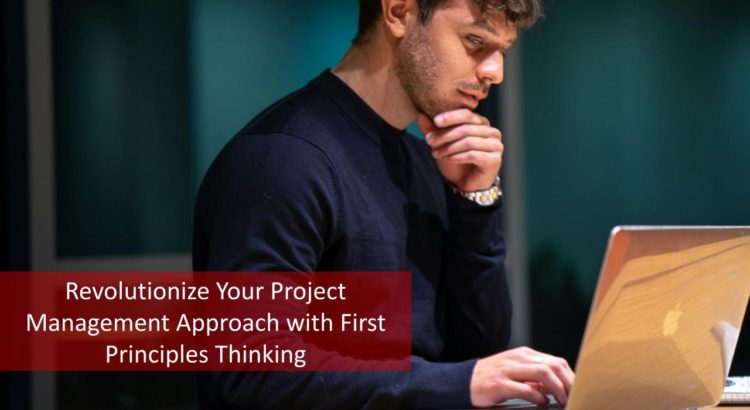In the rapidly changing landscape of certified project management and agile project management, success hinges not just on following established methodologies but on the ability to think critically and innovatively. Traditional approaches, while valuable, may sometimes limit our perspective and hinder adaptability. This is where first principles thinking comes into play—a foundational problem-solving approach that can transform how you manage projects, lead teams, and deliver value.
- Explore Master of Project Academy’s Project Management Courses
What Is First Principles Thinking?
First principles thinking is a method of reasoning that involves breaking down complex problems into their most basic, fundamental elements—the indisputable truths—and then reconstructing solutions from the ground up. Instead of relying on analogies or past experiences, this approach encourages you to question every assumption and explore new possibilities based solely on these fundamental truths.
As Aristotle, the ancient philosopher, stated, first principles are “the first basis from which a thing is known.” By applying this method, project managers can bypass the limitations imposed by conventional wisdom and uncover innovative solutions that others might overlook.
The Importance of First Principles Thinking in Project Management
1. Fosters True Innovation
In the realm of certified project management, adhering strictly to established processes can sometimes stifle creativity. First principles thinking breaks this mold by encouraging you to challenge existing paradigms and explore uncharted territories. This approach can lead to groundbreaking strategies that differentiate your projects and organizations in a competitive market.
For example, instead of accepting that a project’s timeline must be extended due to resource constraints, first principles thinking would have you question the underlying reasons for these constraints and explore alternative resource utilization strategies.
2. Enhances Strategic Problem-Solving
Complex projects often present intricate challenges that standard methodologies may not adequately address. By deconstructing problems to their core components, you gain a deeper understanding of the underlying issues. This granular insight enables you to develop targeted, effective solutions—a critical advantage in both traditional and agile project management environments.
Consider a project suffering from scope creep. By applying first principles thinking, you might discover that the root cause is not poor scope management but misaligned stakeholder expectations, prompting a strategic shift in stakeholder engagement practices.
3. Eliminates Cognitive Biases and Assumptions
Assumptions and biases can cloud judgment and lead to suboptimal decisions. First principles thinking compels you to question every premise, ensuring that your strategies are built on solid ground. This rigorous scrutiny helps eliminate misconceptions and aligns your projects with reality, increasing the likelihood of success.
For instance, assuming that a vendor’s proposed solution is the best fit because of their reputation may overlook more suitable or cost-effective alternatives. By dissecting the vendor’s proposal to its fundamentals, you can objectively assess its true value.
4. Promotes Efficiency and Resource Optimization
Projects are often constrained by limited resources and tight deadlines. By focusing on the essential elements, first principles thinking helps you identify areas where resources can be optimized. This approach reduces waste, improves efficiency, and can significantly impact the bottom line.
For example, by questioning the necessity of certain project meetings or documentation, you might streamline communication processes, freeing up valuable time and resources.
Check out the 15 Unconventional Careers That Can Benefit from Agile Methodologies
Applying First Principles Thinking in Certified Project Management
Certified project managers are trained in established frameworks like PMBOK (Project Management Body of Knowledge) or PRINCE2. While these frameworks provide a valuable foundation, integrating first principles thinking can enhance their effectiveness.
Step 1: Identify Fundamental Objectives
Begin by clearly defining the fundamental objectives of your project. What is the core value you aim to deliver? Understanding this helps align all subsequent decisions with the primary goal.
- Example: If the fundamental objective is to improve customer satisfaction, every project decision should be evaluated against its impact on the customer experience.
Step 2: Deconstruct Processes
Break down established processes and methodologies to understand their core components. Question each step:
-
- Why is this step necessary?
- Does it directly contribute to the project’s fundamental objectives?
- Can it be simplified or improved?
- Example: In risk management, instead of using a generic risk register, tailor it to focus only on risks that could significantly impact your project’s core objectives.
Step 3: Challenge Existing Assumptions
Identify assumptions underlying your project plan, such as resource availability, technology capabilities, or market conditions. Question their validity:
-
- Are these assumptions based on current, accurate information?
- What evidence supports them?
- What if they are incorrect?
- Example: If you’re assuming that a particular technology will be available throughout the project, consider the implications if it becomes obsolete or unsupported.
Step 4: Reconstruct Tailored Solutions
Using the fundamental truths you’ve identified, reconstruct your project plan. This new plan should be tailored to address the core objectives efficiently, free from unnecessary complexities or outdated practices.
- Example: Develop a customized project methodology that combines elements from different frameworks (like Agile and Waterfall) to best suit your project’s unique needs.
Enhancing Agile Project Management with First Principles Thinking
Agile project management thrives on adaptability, customer collaboration, and iterative development. First principles thinking aligns perfectly with these values, providing a framework for deeper analysis and innovation.
Embrace Agile Values at a Fundamental Level
Re-express agile values in terms of first principles:
- Customer Collaboration Over Contract Negotiation: The fundamental truth is that delivering value to the customer is paramount.
- Responding to Change Over Following a Plan: Change is inevitable; embracing it leads to better outcomes.
- Individuals and Interactions Over Processes and Tools: People are the core drivers of success.
By understanding these principles, you can make decisions that truly embody the spirit of Agile rather than just its practices.

Iterative Problem Deconstruction
In agile sprints, use first principles thinking to:
- Break Down User Stories: Decompose user stories to understand the fundamental need or problem they address.
- Optimize Sprint Planning: Question whether the planned tasks are the most effective way to achieve the sprint goals.
- Enhance Retrospectives: Encourage team members to delve deeper into issues, identifying root causes rather than just symptoms.
Check out Master of Project Academy’s Agile courses
Real-World Example: Innovating in Software Development
A software development team faces persistent delays due to integration issues. Applying first principles thinking:
- Identify the Core Problem: Frequent integration conflicts are causing delays.
- Deconstruct: Examine the integration process, code branching strategies, and team communication.
- Challenge Assumptions: Is the current branching strategy optimal? Are the tools used the best fit?
- Reconstruct: Implement continuous integration with automated testing, adopt a trunk-based development approach, and enhance communication protocols.
By addressing the fundamental issues, the team reduces integration conflicts, accelerates development cycles, and improves product quality.
Overcoming Challenges in Applying First Principles Thinking
Resistance to Change
Team members and stakeholders may be resistant to questioning established practices.
- Solution: Foster an open culture where questioning and innovation are encouraged. Use data and case studies to demonstrate the benefits of first principles thinking.
Time Constraints
Deconstructing problems takes time, which may be seen as a luxury.
- Solution: Integrate first principles thinking into existing processes incrementally. Start with critical areas where the impact will be most significant.
Lack of Fundamental Knowledge
Applying first principles requires a deep understanding of the subject matter.
- Solution: Invest in training and development. Encourage continuous learning within your team to build the necessary expertise.
Check out our Leadership program here.
Integrating First Principles Thinking with Project Management Frameworks
First principles thinking doesn’t require abandoning established frameworks; instead, it enhances them.
Tailor Methodologies to Fit Your Project
Use first principles to adapt methodologies like PMBOK or Scrum to better suit your project’s unique needs.
- Example: If certain documentation processes in PMBOK don’t add value to your project, streamline or eliminate them.
Improve Risk Management
By understanding the fundamental risks, you can develop more effective mitigation strategies.
- Example: Instead of listing generic risks, focus on those that could fundamentally derail your project and allocate resources accordingly.
Enhance Stakeholder Engagement
Focusing on core stakeholder needs ensures better alignment and satisfaction.
- Example: Use first principles to understand what stakeholders fundamentally want from the project, which may differ from what they initially articulate.
How to Incorporate First Principles Thinking into Your Practice
Cultivate a Mindset of Curiosity
Encourage yourself and your team to constantly ask “Why?” and “How?” about every aspect of the project.
- Practice: During meetings, dedicate time to question and discuss fundamental assumptions.
Utilize Socratic Questioning
Adopt disciplined questioning to explore ideas and uncover underlying assumptions.
- Questions to Ask:
- What evidence supports this?
- Is this always the case?
- What are the alternatives?
Document Fundamental Truths
Create a knowledge base of fundamental principles relevant to your projects.
- Benefit: This serves as a reference for future projects and decision-making processes.
Continuous Learning and Development
Stay updated with the latest developments in certified project management and agile project management.
- Action: Pursue advanced certifications and attend workshops or seminars.
Check out Master of Project Academy Sandbox Membership which will help you to stay up-to-date on project management.
Apply Systems Thinking
Understand how different parts of the project interact within the larger system.
- Benefit: This holistic view can reveal interdependencies and opportunities for optimization.
The Synergy Between First Principles Thinking and Agile Methodologies
Agile methodologies are inherently aligned with first principles thinking due to their emphasis on flexibility and continuous improvement.
Continuous Improvement (Kaizen)
First principles thinking can deepen the practice of Kaizen by ensuring improvements are based on fundamental insights rather than superficial fixes.
Empirical Process Control
Agile relies on empirical data to make decisions. First principles thinking complements this by questioning the underlying causes of observed data trends.
Collaboration and Self-Organizing Teams
Empowering teams to think from first principles fosters innovation and ownership.
- Example: Teams can develop unique solutions tailored to their specific challenges rather than relying on prescribed methods.
Conclusion
First principles thinking is more than a problem-solving technique; it’s a transformative mindset that can elevate your practice of certified project management and agile project management. By stripping away assumptions and focusing on fundamental truths, you unlock the potential for innovation, efficiency, and strategic excellence.
In an era where adaptability and innovation are critical, integrating first principles thinking into your project management approach is not just beneficial—it’s essential. Embrace this mindset to revolutionize your projects, inspire your teams, and deliver unparalleled value to your stakeholders.
About Master of Project Academy
At Master of Project Academy, we’re committed to empowering professionals with cutting-edge knowledge and skills. Our comprehensive courses in certified project management and agile project management are designed to equip you with the tools to think critically and lead effectively. Join us today and take the next step in your project management journey.
